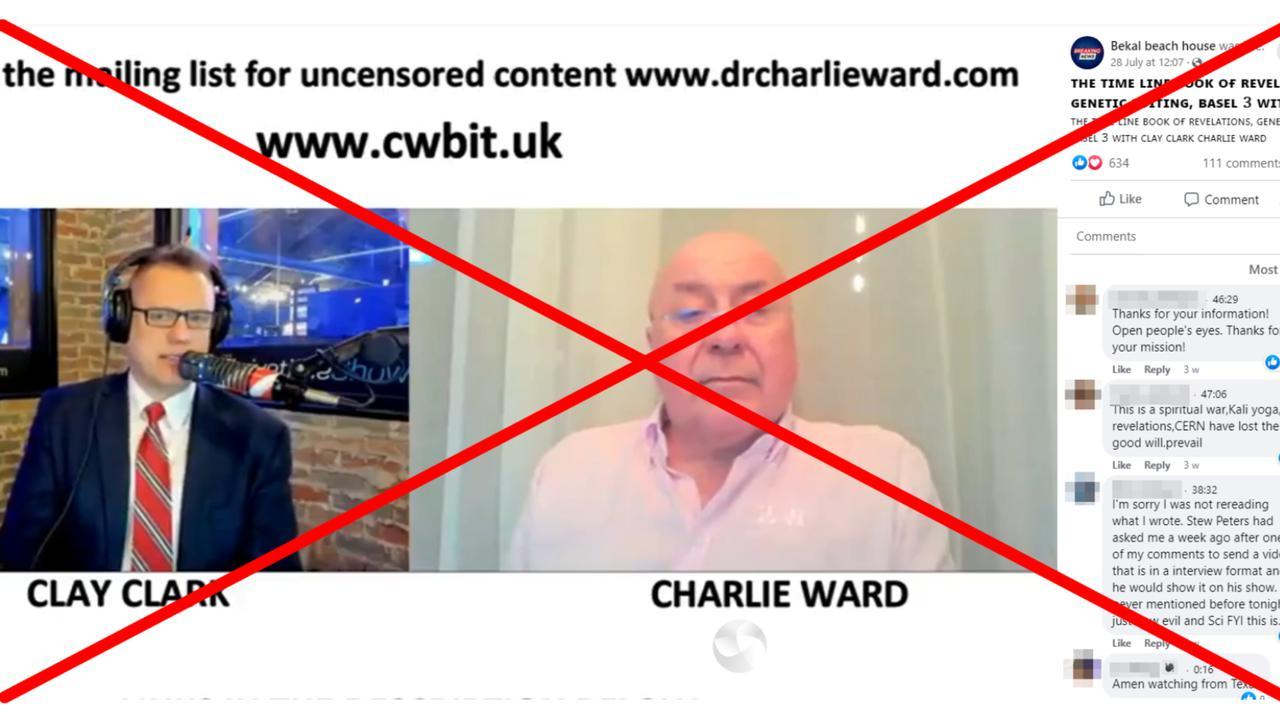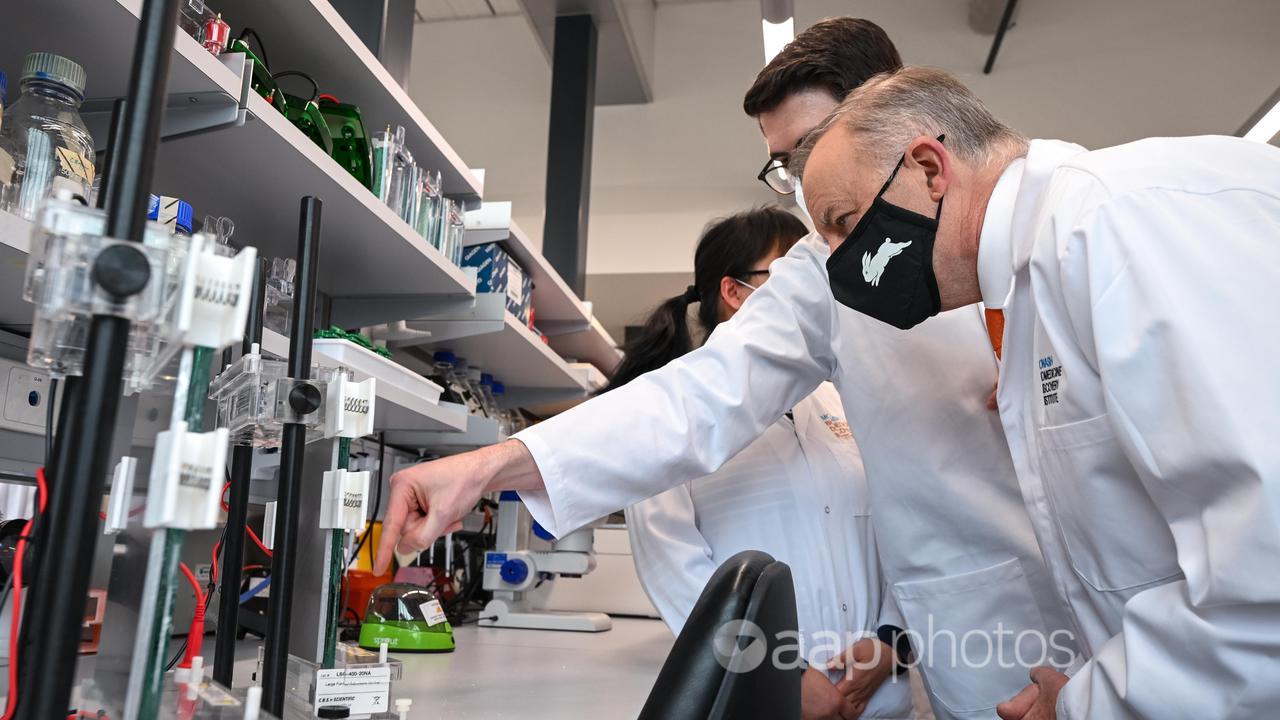Nanowires crossed in claim linking patent to 5G and COVID-19
A conspiracy-centric Facebook chat show claims US chemist Charles Lieber listed a patent for a device in 2015 that could vibrate coronavirus particles with 5G radiation.
The claim is false. Experts say the patent has nothing to do with 5G or COVID-19, and the patent submission document makes no mention of either the virus or mobile phone network.
In the Facebook video (screenshot here) posted on July 28, COVID-19 conspiracy theorist Clay Clark says: “So 2015, Charles Lieber … he creates a patent for using 5G radiation to vibrate coronavirus particles from preset nanotubal containers,” (video mark 17min 34sec).
Clark then quotes from the abstract of a patent application filed by a multi-national team including Lieber: “… the present invention is directed to electronic devices that can be injected or inserted into soft matter, such as biological tissue or polymeric matrixes. For example, the device may be passed through a syringe or a needle,” (video mark 18min 28sec).
Clark says this proves the patent relates to COVID-19 and provides evidence of the use of electronic elements in mRNA vaccines, one of many conspiracy theories linking 5G to the pandemic, as seen here, here and here.

However, experts told AAP FactCheck this is not the case.
Dr Vipul Agarwal, a biomedical engineering expert from UNSW, confirmed there was no basis to support the claim.
“Based on my reading of the provided patent, it is my understanding that the patent has nothing to do with 5G technology or coronavirus. Further, this patent and the invented technology does not deal with Covid-19 vaccines,” Dr Agarwal said in an email.
Dr Agarwal says the patent relates to using nanoscale electrical wires to assist in stimulating tissue and encouraging tissue regeneration.
“The patent is about the development of nanoscale wire delivery methods for biomedical engineering-based tissue regeneration applications in tissues such as heart, muscle and brain. The nanoscale wire technology presented in this patent is aimed at electrically stimulating innate tissue which is in contact with the implanted nanoscale wires (which act as electrodes).”
Professor Zdenka Kuncic, an expert on bio-nanoscience from the University of Sydney, also says there’s no link between the patent and either 5G or COVID-19.
“The nanoscale wires the patent refers to do not have any possible relation to coronaviruses or 5G,” Prof Kuncic told AAP FactCheck in an email.
“The nanowires are good conductors of electricity, so their application is mainly for bioelectronic devices (e.g. interfacing with the central nervous system, which works by sending electrical signals). They do not interact with electromagnetic radiation, which is a completely different phenomenon from electricity.”
Experts say there is also no scientific evidence to support the claim there could be some connection between injectable nanowires and mRNA vaccines.
AAP FactCheck contacted the Faculty of Pharmacy and Pharmaceutical Sciences at Monash University, which developed Australia’s first mRNA COVID-19 vaccine.
Harry Al-Wassiti, a member of the COVID-19 vaccine team at Monash, says mRNA vaccines can’t be manipulated by electromagnetic interference as they are not made of conductive material.
Dr Al-Wassiti said in order to achieve any electromagnetic conductance the wires or particles had to be “conductive (metal) or semi conductive”.
“The mRNA vaccines are made of fat nanoparticles and are certainly not conductive,” he said in an email.

Dr Al-Wassiti also said just because different particles were in the nanoscale, it doesn’t mean they all shared the same criteria.
“”Nanoparticles’ is a name given merely to describe the size of a given particle. Natural milk for example is made of many natural fat nanoparticles,” he said.
“Therefore, the claim that lipid mRNA vaccines somehow conduct 5G is NOT supported by any evidence or logic and goes against the basic laws of physics & chemistry.”
Lieber is a prominent academic, renowned for his research into nanoscale materials and nanotechnology, with a particular focus on the application of nanotechnology in biology and medicine.
The Harvard professor was arrested and charged in 2020, following a US Department of Justice investigation into his links with Chinese researchers. A jury found him guilty of six charges in December 2021.
Lieber has been prolific in the field of nanoscale technology. This patent is one of dozens he made while researching medical applications for the technology.
AAP FactCheck previously debunked claims Lieber was arrested for manufacturing and selling coronavirus to China.
The Verdict
The claim an academic lodged a patent for using 5G to vibrate COVID-19 particles in 2015 is false. The patent makes no mention of 5G or coronaviruses. Experts told AAP FactCheck there is no scientific basis to support the idea nanowires can interact with 5G radiation or that the technology can be used to manipulate mRNA vaccine particles.
False – The claim is inaccurate.
* AAP FactCheck is an accredited member of the International Fact-Checking Network. To keep up with our latest fact checks, follow us on Facebook, Twitter and Instagram.
All information, text and images included on the AAP Websites is for personal use only and may not be re-written,
copied, re-sold or re-distributed, framed, linked, shared onto social media or otherwise used whether for compensation
of any kind or not, unless you have the prior written permission of AAP. For more information, please refer to our
standard terms and conditions.


